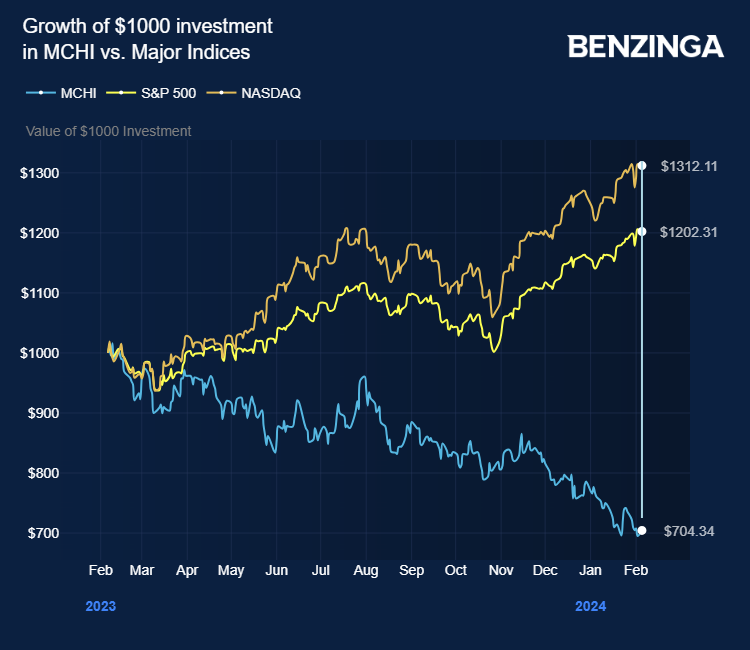Zinger Key Points
- Chinese official announce raft of measures, prompting market rally.
- Concerns remain that small-cap Chinese stocks will continue to sell off.
- Feel unsure about the market’s next move? Copy trade alerts from Matt Maley—a Wall Street veteran who consistently finds profits in volatile markets. Claim your 7-Day free trial now.
Chinese equity markets rebounded strongly on Tuesday after pledges of support from government and agency officials followed recent market routs that took several main indexes to five-year lows.
At the close in China, the main indexes were all significantly higher. The Hang Seng in Hong Kong gained 4%, with index heavyweights such as JD.com JD and Alibaba BABA both nearly 8% higher. The top gainer was beleaguered real estate company Longfor Properties LGFRY, up 10.1%.
Mohamed El-Erian, senior economic adviser to Allianz, said on X, formerly known as Twitter, on Tuesday: “Major indices surged higher today on signs of growing government concern about the negative spill over effects on confidence and the economy of recent market hits.”
It has been reported many times over recent trading sessions that Chinese mainland equity markets have lost around $6 trillion in the last three years. But the selloff has intensified as foreign investors have fled the market, leaving domestic investors with little alternative but to sell also.
Indeed, in December alone, global funds sold around $2 billion in stocks, according to Bloomberg data, and that is likely to have increased in January given the intensity of the stock market rout during the first month of 2024.
Mainland China Stocks Outperform
Tuesday’s ray of hope drove mainland stocks even higher than the Hang Seng index, with the CSI 1000, a broad composite of stocks on the Shanghai and Shenzhen exchanges, ending 7% higher.
The iShares MSCI China ETF MCHI, a U.S.-listed exchange traded fund that holds Chinese stocks, rose 1.3% on Monday and was up 3.5% in premarket trade on Tuesday.

Also Read: Alibaba Earnings: Can Q4 Earnings Provide Pivot Point For Beleaguered Investors?
After markets closed on Monday there were a number of reports that the government and its agencies were taking action to shore up equity markets and make it more attractive for foreign investors.
China’s securities regulator said it would guide institutional investors to increase stock buying. The China Securities Regulatory Commission said it was urging long-term funds to resume buying, while calling on listed companies to begin share buyback schemes.
“Every effort will be made to maintain stable market operations,” the regulator said in a statement.
Moves to allow foreign buyers deeper access into stocks they’d previously been restricted from owning — such as manufacturing sector stocks — were underway, according to the National Development and Reform Commission.
And it was reported from several sources that President Xi Jinping was to meet with officials and markets experts to discuss recent market losses and what can be done to support stocks.
Concerns Over Small Caps Remain
These pledges followed measures in recent days to stop the sell-off by limiting investors’ ability to sell stocks. A total ban on lending stocks for the purpose of short selling was also enacted.
But investors remained concerned over small-cap stocks, which have seen the bulk of the selling. They are concerned that government and fund efforts to resume buying will focus on large-cap stocks and that small caps will continue to be sold.
“Much of the recent weakness has been concentrated in small cap Chinese stocks. Markets are looking for signs of Xi pledging to support these small caps. Until then, we expect volatility to remain elevated,” said The Kobeissi Letter on X.
Now Read: China Market Rout Continues, With Small Caps Feeling The Pain Despite Beijing’s Intervention
Photo via Shutterstock.
Edge Rankings
Price Trend
© 2025 Benzinga.com. Benzinga does not provide investment advice. All rights reserved.
Trade confidently with insights and alerts from analyst ratings, free reports and breaking news that affects the stocks you care about.